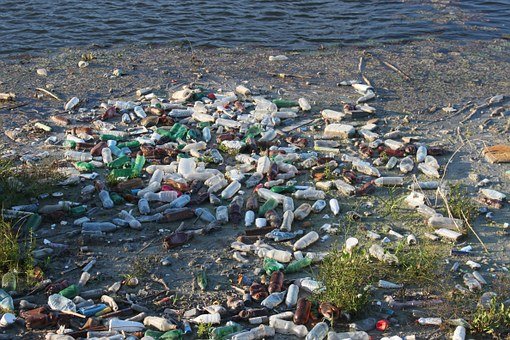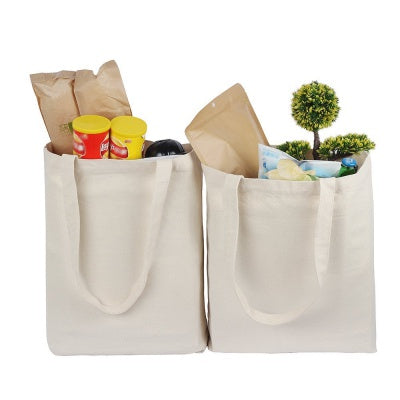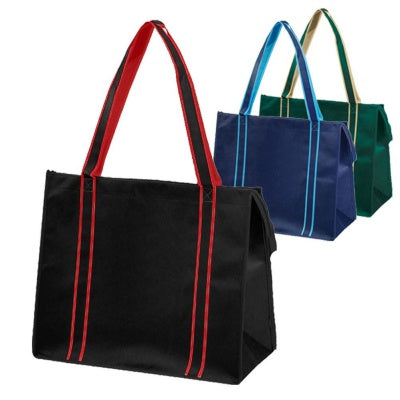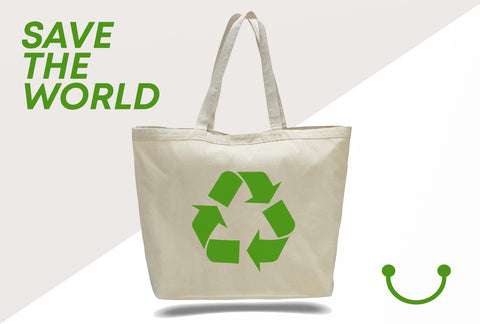
Today we will focus on the environmental impact of reusable grocery bags, as more and more countries worldwide impose bans on plastic shopping bags. Many EU countries, the UK, in United States and other countries are now in a veritable race against time and plastic, proposing alternatives to the common, ubiquitous plastic bag. The answer to the problem seems to be reusable grocery bags, in cotton, hemp, paper, and nonwoven polypropylene. Are they any good? We will found out in a few moments.
The Main Problem with Plastic Bags

The world seems to be suffocating under endless piles of plastic bags and we need to act as soon as possible to prevent further damage to the environment and ourselves.
According to the Environmental Protection Agency, in the United States people use over 380 billion plastic bags and wraps each year. In order to produce this amount of plastic bags, the industry requires around 12 million barrels of oil (to which they add water, electricity, and so on).
Unfortunately, people recycle less than 5% of plastic on a global level, a drop of water in an ocean of almost 1 trillion plastic bags used worldwide annually.
In this framework, there is no wonder we came to talk about the Great Pacific Garbage Patch (estimated to be double in size than Hawaii) and damaged ecosystems. The question is this: is a reusable bag friendlier than a plastic one?
Cotton / Canvas Shopping Bags

In the last years, we witness great emphasis on using canvas shopping bags as an eco-friendly alternative to using plastic bags. A debate on the eco-friendliness of canvas shopping bags ensued a few years back, as a study found we have to use a canvas shopping bag more than 100 times in a row in order for it to become environmentally safe.
The environmental impact of reusable grocery bags is low only when we truly reuse the bags regularly. If we buy a cotton or canvas tote bag for shopping, using it once and storing it in a cabinet is almost the same as using a plastic bag.
So what does it take a cotton or canvas shopping bag to become environmentally friendly? Let us see what you should do:
- Buy a few reusable shopping bags in canvas or cotton in different sizes, shapes, and types; if you keep them close, in your trunk for instance, when you go grocery shopping, you will feel less tempted to also buy plastic shopping bags;
- The more canvas shopping bags you have, the better you will manage all types of groceries, thus giving up plastic bags completely;
- One major problem with the sustainability of a shopping bag is its disposal; you can use a plastic shopping bag a few times and even use it as a garbage bag, but eventually, plastic shopping bags suffer wear and tear;
- In comparison, canvas and cotton shopping bags are more resilient to wear and tear, they are washable, and you can repurpose them when their lifecycle reaches its end; if you have to use a cotton shopping bag 100 times so it becomes eco-friendly, you will have no problem in doing so.
Paper Shopping Bags

While paper is biodegradable, making it an eco-friendly material, producing paper bags – just like producing cotton bags – requires the use of trees, water, and electricity in significant amounts. One may consider using recycled paper for shopping bags, but this is not a good strategy, as recycled paper is rather frail and it will not hold groceries.
However, we have to consider some advantages when using paper shopping bags:
- If we reuse them properly, paper bags become eco-friendly during their lifetime and afterward;
- One of the main advantages of paper bags is that they have an afterlife as well, as strange as it may sound – you can take them to a paper recycling unit or compost them;
When we talk about the environmental impact of reusable grocery bags, it is important to consider more than just their production costs and requirements. While it is cheaper and less carbon-heavy to produce plastic bags, their “afterlife” is what we need to take into consideration.
Cotton tote bags for shopping are reusable even when we do not use them anymore – as we can repurpose them. When it comes to paper bags, we can incinerate them, compost them, or repurpose them for different home activities. Even if cotton bags, paper bags, or biodegradable trash bags end up in a landfill, they are biodegradable, therefore easier on the environment.
In other words, cotton and canvas bags, together with paper bags, are more eco-friendly choices than plastic bags.
How about Nonwoven Polypropylene Bags?

Nonwoven polypropylene plastic bags are more and more common. You can buy them at the supermarket as reusable grocery bags. This type of plastic material is incredibly resilient to wear and tear. Such bags are also waterproof and you can clean any stains or spills with water.
You should also know that studies confirmed they have a lower carbon impact to produce. Here are some of the things you need to know about nonwoven polypropylene bags:
- You should reuse them at least fifty times for them to get eco-friendly; this means once a week for a year, which does not seem much if you consider you can keep one or two of them in the trunk and just take them out when you go shopping;
- They are resilient to wear, tear, and the elements – making it easy for you to reuse them; both paper bags and cotton bags get wet and suffer from weather damages;
- They can carry very heavy loads; this makes them more suitable to shopping than paper bags, which have a limited capacity of carrying heavy loads;
- You can clean and wash nonwoven shopping bags with water and even stain removers if you need to; you can also wash cotton and canvas shopping bags, but the number of times you use water, electricity, and detergents to clean them add up to their environmental impact.
Conclusion

As plastic suffocates our lands and oceans, we need to find alternatives in order to protect ecosystems, wildlife, and ourselves. While producing plastic bags is cheaper and less harmful than producing cotton bags, for instance, their life cycle and afterlife are criteria we cannot neglect.
As research continues, it is clear that the smartest and eco-conscious choice is to use canvas bags and nonwoven polypropylene bags. Granted, we need to use them for a year or two in a row and make the best out of them, but this is clearly a better strategy than contributing to oceanic garbage patches or landfills.

